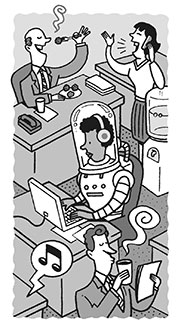 This morning's Sunday New York Times has a well-researched piece by Phyllis Korkki in her Career Couch column called "I Find You Annoying, But I Can Cope." It starts out with a quote from Jonathan Littman about the implications of the ideas in I Hate People for dealing people who bug you at work (see their post), and travels through a lot different methods for coping with the problem from several other researchers and the like. I was quoted in the article several times, emphasizing some of my favorite themes from The No Asshole Rule including the virtues of learning indifference and emotional detachment to deal with people who bug you, especially when you can't make an immediate escape — to not let them touch your soul as I say so often.
This morning's Sunday New York Times has a well-researched piece by Phyllis Korkki in her Career Couch column called "I Find You Annoying, But I Can Cope." It starts out with a quote from Jonathan Littman about the implications of the ideas in I Hate People for dealing people who bug you at work (see their post), and travels through a lot different methods for coping with the problem from several other researchers and the like. I was quoted in the article several times, emphasizing some of my favorite themes from The No Asshole Rule including the virtues of learning indifference and emotional detachment to deal with people who bug you, especially when you can't make an immediate escape — to not let them touch your soul as I say so often.
Alas, very early in my conversations with Phyllis she informed that, as had happened with The New York Times from the outset, they wouldn't publish the name of my book, even though it is a bestseller, the ideas are used in many companies, it was on their bestseller list (albeit as The No ******* Rule), and they accepted a lot of money from my publisher to print large ads that mocked them for not printing the title. In fact, they weren't even willing to indicate that I was an author of a book on the subject in the article. I find the whole thing silly but made clear to Phyllis that I understood Times policy and we should go ahead with the interviews, and I think she did a great job of capturing all sorts of ways of coping with challenge of working with people who drive you crazy. This censorship thing comes with the territory, and as I wrote here and here at Huffington awhile back, is something I've tried to have fun with — but I remain amazed by who is offended and who is not by the title — it was fine for a bible studies class, the Wall Street Journal, and Fortune, but not for The New York Times!
I also wanted to dig into my comment in the article about the virtues of using headphones when you are in a loud office environment that makes it hard to concentrate (The above drawing takes this to its logical conclusion, because as I mentioned to her and Jonathan did too, I described how conflicts sometimes erupt in workplaces because other eat food that smells bad to their colleagues). When I talked to Phyllis, I mentioned that a good pair of noise-canceling headphones had prov en essential to my son for shutting-out his loud college roommate last year. In addition, it reminded me of 1995 study (here is the reference and abstract)by Greg Oldham and his colleagues, an experiment conducted in an organization, where they gave a random sample of employees the opportunity to listen to headphones while they worked (people who held diverse jobs in retail organization) and then tracked their tracked their reactions for four weeks, and compared them to people in a control condition who weren't offered the chance to use headphones. They found employees who used headphones "exhibited significant improvements in performance, turnover intentions,
organization satisfaction, mood states, and other responses." They also found that people in the most boring and simple jobs had the most positive reactions to wearing the headphones… so there is some decent, if not definitive, evidence to support the use of headphones.